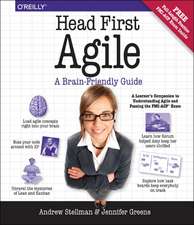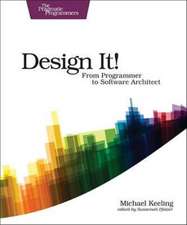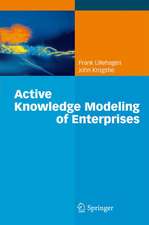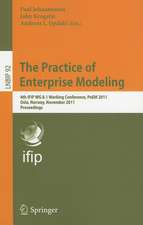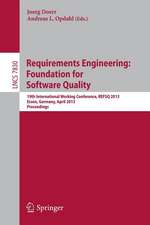Advanced Information Systems Engineering: 19th International Conference, CAiSE 2007, Trondheim, Norway, June 11-15, 2007, Proceedings: Lecture Notes in Computer Science, cartea 4495
Editat de John Krogstie, Andreas L. Opdahl, Guttorm Sindreen Limba Engleză Paperback – 31 mai 2007
Din seria Lecture Notes in Computer Science
- 20%
 Preț: 1061.55 lei
Preț: 1061.55 lei - 20%
 Preț: 307.71 lei
Preț: 307.71 lei - 20%
 Preț: 438.69 lei
Preț: 438.69 lei - 20%
 Preț: 645.28 lei
Preț: 645.28 lei -
 Preț: 410.88 lei
Preț: 410.88 lei - 15%
 Preț: 580.46 lei
Preț: 580.46 lei - 17%
 Preț: 427.22 lei
Preț: 427.22 lei - 20%
 Preț: 596.46 lei
Preț: 596.46 lei -
 Preț: 449.57 lei
Preț: 449.57 lei - 20%
 Preț: 353.50 lei
Preț: 353.50 lei - 20%
 Preț: 1414.79 lei
Preț: 1414.79 lei - 20%
 Preț: 309.90 lei
Preț: 309.90 lei - 20%
 Preț: 583.40 lei
Preț: 583.40 lei - 20%
 Preț: 1075.26 lei
Preț: 1075.26 lei - 20%
 Preț: 310.26 lei
Preț: 310.26 lei - 20%
 Preț: 655.02 lei
Preț: 655.02 lei - 20%
 Preț: 580.93 lei
Preț: 580.93 lei - 20%
 Preț: 340.32 lei
Preț: 340.32 lei - 18%
 Preț: 938.83 lei
Preț: 938.83 lei - 20%
 Preț: 591.51 lei
Preț: 591.51 lei - 15%
 Preț: 438.59 lei
Preț: 438.59 lei - 20%
 Preț: 337.00 lei
Preț: 337.00 lei -
 Preț: 389.48 lei
Preț: 389.48 lei - 20%
 Preț: 607.39 lei
Preț: 607.39 lei - 20%
 Preț: 1024.44 lei
Preț: 1024.44 lei - 20%
 Preț: 579.30 lei
Preț: 579.30 lei - 20%
 Preț: 763.23 lei
Preț: 763.23 lei - 20%
 Preț: 453.32 lei
Preț: 453.32 lei - 20%
 Preț: 575.48 lei
Preț: 575.48 lei - 20%
 Preț: 585.88 lei
Preț: 585.88 lei - 20%
 Preț: 825.93 lei
Preț: 825.93 lei - 20%
 Preț: 763.23 lei
Preț: 763.23 lei - 17%
 Preț: 360.19 lei
Preț: 360.19 lei - 20%
 Preț: 1183.14 lei
Preț: 1183.14 lei - 20%
 Preț: 340.32 lei
Preț: 340.32 lei - 20%
 Preț: 504.57 lei
Preț: 504.57 lei - 20%
 Preț: 369.12 lei
Preț: 369.12 lei - 20%
 Preț: 583.40 lei
Preț: 583.40 lei - 20%
 Preț: 343.62 lei
Preț: 343.62 lei - 20%
 Preț: 350.21 lei
Preț: 350.21 lei - 20%
 Preț: 764.89 lei
Preț: 764.89 lei - 20%
 Preț: 583.40 lei
Preț: 583.40 lei - 20%
 Preț: 649.49 lei
Preț: 649.49 lei - 20%
 Preț: 341.95 lei
Preț: 341.95 lei - 20%
 Preț: 238.01 lei
Preț: 238.01 lei - 20%
 Preț: 538.29 lei
Preț: 538.29 lei
Preț: 664.11 lei
Preț vechi: 830.14 lei
-20% Nou
Puncte Express: 996
Preț estimativ în valută:
127.08€ • 132.95$ • 105.56£
127.08€ • 132.95$ • 105.56£
Carte tipărită la comandă
Livrare economică 03-17 aprilie
Preluare comenzi: 021 569.72.76
Specificații
ISBN-13: 9783540729877
ISBN-10: 3540729879
Pagini: 606
Ilustrații: XVI, 606 p.
Dimensiuni: 155 x 235 x 37 mm
Greutate: 0.93 kg
Ediția:2007
Editura: Springer Berlin, Heidelberg
Colecția Springer
Seriile Lecture Notes in Computer Science, Information Systems and Applications, incl. Internet/Web, and HCI
Locul publicării:Berlin, Heidelberg, Germany
ISBN-10: 3540729879
Pagini: 606
Ilustrații: XVI, 606 p.
Dimensiuni: 155 x 235 x 37 mm
Greutate: 0.93 kg
Ediția:2007
Editura: Springer Berlin, Heidelberg
Colecția Springer
Seriile Lecture Notes in Computer Science, Information Systems and Applications, incl. Internet/Web, and HCI
Locul publicării:Berlin, Heidelberg, Germany
Public țintă
ResearchCuprins
Keynote.- Agile Software Development of Mobile Information Systems.- Ontologies.- Modal Aspects of Object Types and Part-Whole Relations and the de re/de dicto Distinction.- Change Detection in Ontologies Using DAG Comparison.- Automatic Generation of Model Translations.- Extended Enterprises.- Handling Instance Correspondence in Inter-organisational Workflows.- Assessing Feasibility of IT-Enabled Networked Value Constellations: A Case Study in the Electricity Sector.- Behavioral Consistency for B2B Process Integration.- Information Integration.- Declarative XML Data Cleaning with XClean.- Personalizing PageRank-Based Ranking over Distributed Collections.- Generic Schema Merging.- Service-oriented Architecture I.- Discovering Web Services to Specify More Complete System Requirements.- On ISOA: Intentional Services Oriented Architecture.- WSXplorer: Searching for Desired Web Services.- Strategic Alignment.- e 3 forces: Understanding Strategies of Networked e 3 value Constellations by Analyzing Environmental Forces.- Aligning IS to Organization’s Strategy: The InStAl Method.- Towards a Framework for Tracking Legal Compliance in Healthcare.- Service-oriented Architecture II.- Conceptual Modeling of Privacy-Aware Web Service Protocols.- Policies for Context-Driven Transactional Web Services.- On Automated Generation of Web Service Level Agreements.- Requirements I.- RED-PL, a Method for Deriving Product Requirements from a Product Line Requirements Model.- Deciding to Adopt Requirements Traceability in Practice.- Designing Social Patterns Using Advanced Separation of Concerns.- Process Modelling I.- Modeling Business Contexture and Behavior Using Business Artifacts.- Policies and Aspects for the Supervision of BPEL Processes.- Goal Annotation of Process Models for Semantic Enrichment of Process Knowledge.- Requirements II.- Stakeholder Identification as an Issue in the Improvement of Software Requirements Quality.- The Impact of Task Structure and Negotiation Sequence on Distributed Requirements Negotiation Activity, Conflict, and Satisfaction.- Introducing Graphic Designers in a Web Development Process.- Process Modelling II.- Communication Abstractions for Distributed Business Processes.- Questionnaire-driven Configuration of Reference Process Models.- Formalization and Verification of EPCs with OR-Joins Based on State and Context.- Method Engineering.- Towards More Extensible MetaCASE Tools.- Concepts for Incremental Method Evolution: Empirical Exploration and Validation in Requirements Management.- ReeF: Defining a Customizable Reengineering Framework.- Novel Applications.- Publishing and Discovering Information and Services for Tagged Products.- Automating Standard Operating Procedures in Intensive Care.- Composing Data-Providing Web Services in P2P-Based Collaboration Environments.- Participative Modelling.- Participative Enterprise Modeling: Experiences and Recommendations.- Negotiating Models.- Process-Aware Information Systems.- Change Patterns and Change Support Features in Process-Aware Information Systems.- Analyzing the Dynamic Cost Factors of Process-Aware Information Systems: A Model-Based Approach.











